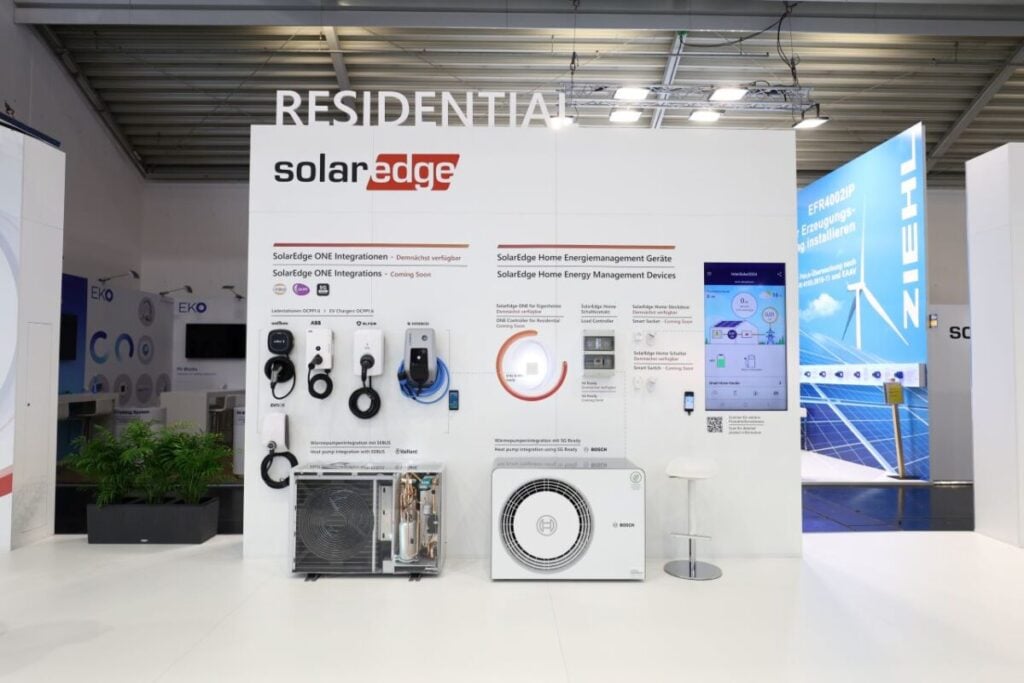
Israel-headquartered inverter and energy management solutions provider SolarEdge has shipped 1.2GW of PV inverters in the first quarter of 2025.
This is the first time the company has passed the 1GW threshold in a quarter since Q3 2023, and after reaching a five-year low of 850MW inverters shipped in Q3 2024. The growth in shipped inverters came from the residential solar segment with 601MW, nearly doubling the 302MW shipped in Q1 2024, and a quarterly increase from the 329MW shipped in Q4 2024. Year-on-year, the commercial segment did register a drop from 640MW to 586MW in Q1 2025, while utility saw 22MW of shipped PV inverters.
Try Premium for just $1
- Full premium access for the first month at only $1
- Converts to an annual rate after 30 days unless cancelled
- Cancel anytime during the trial period
Premium Benefits
- Expert industry analysis and interviews
- Digital access to PV Tech Power journal
- Exclusive event discounts
Or get the full Premium subscription right away
Or continue reading this article for free
Residential solar represented half of the total inverters shipped in the first quarter of 2025, a stark increase from the previous quarters in 2024, when the residential segment stagnated to between 32% and 37%.
Shuki Nir, CEO of SolarEdge, said: “We delivered a second straight quarter of positive free cash flow and are executing on our strategic priorities. Despite an uncertain tariff and regulatory environment, we remain relentlessly focused on elevating our execution across our business.”
Nir was appointed as CEO of SolarEdge in December 2024, however he served as the company’s chief marketing executive since June 2024 before succeeding Ronen Faier, who served as interim CEO since August 2024.
Moreover, as inverters shipments increased during Q1 2025, SolarEdge’s revenue also went up by 12% from the previous quarter and also increased year-on-year by 7.4%. The company registered revenues of US$219.5 million in Q1 2025, slightly up from US$204.4 million in Q1 2024.
During Q1 2025 it has also reduced by more than half its generally accepted accounting principles (GAAP) operating loss from the previous quarter, from US$263.7 million to US$102.7 million.
The company provided guidance for Q2 2025 with revenues between US$265-285 million.
4-6% gross margin impact from tariffs during H2 2025
In the US, the inverter manufacturer continues to ramp up its domestic production of inverters, and in Q1 2025 reached quarterly production of 70,000 inverters, which includes the shipment of the company’s first domestic content for commercial and industrial (C&I) products.
Despite reshoring its manufacturing capacity to the US, the company expects that it will be negatively affected by the recent tariffs – 145% on solar products from China and the 10% tariffs on imports from other countries – imposed by Trump’s administration. For the second quarter of 2025, Nir said the gross margin will be limited to a 2% reduction, “as we have non-tariffed inventory already located in the US”.
The impact will be higher in the second half of the year, with between 4-6% of gross margin impact net of pricing adjustments, while the company works towards diversifying its supply chain.
“We are moving quickly and have already taken several actions that we believe will reduce the impact of tariffs to a 2% gross margin impact net of pricing adjustments in Q1 2026 and we will do our best to offset the entire gross margin impact later in 2026,” added Nir.
VPP programmes increased residential battery demand
Outside of its solar segment, the company shipped 180MWh of batteries during Q1 2025. SolarEdge closed its battery storage manufacturing division in November 2024, as reported by our colleagues at Energy-storage.news, to focus on its “core” solar and solar-tied-batteries business. This resulted in around 500 job cuts, mostly in South Korea. Earlier this year, it cut a further 400 positions to “enhance operational cost efficiency”.
Nir said that last month the company sold one of its battery manufacturing facilities in South Korea to US-based battery manufacturer Enovix, while last week SolarEdge divested its tracker business, “which will reduce our operating expenses without a significant impact to our top line,” added Nir.
In the US residential segment, the company has seen an increased demand for its batteries, among others, due to a growing participation in virtual power plant (VPP) programmes. More than a third of its battery attached sites participate in a VPP programme, either through a third-party owner partner or directly.
“We are still in the early stages of our turnaround journey and have lots of work ahead of us,” concluded Nir.






